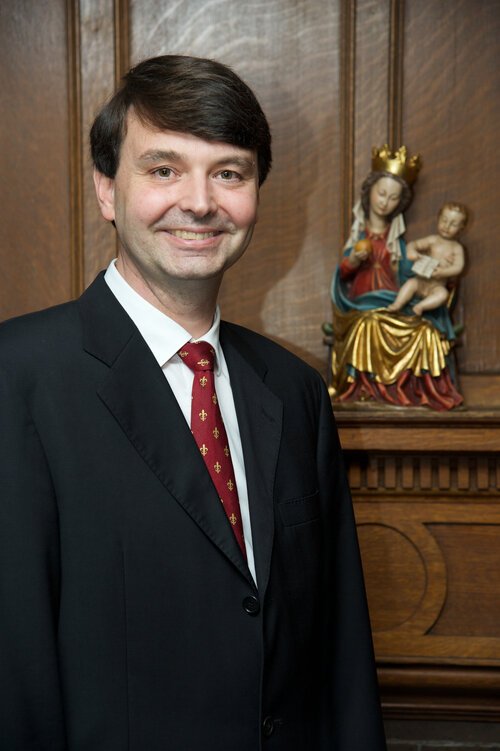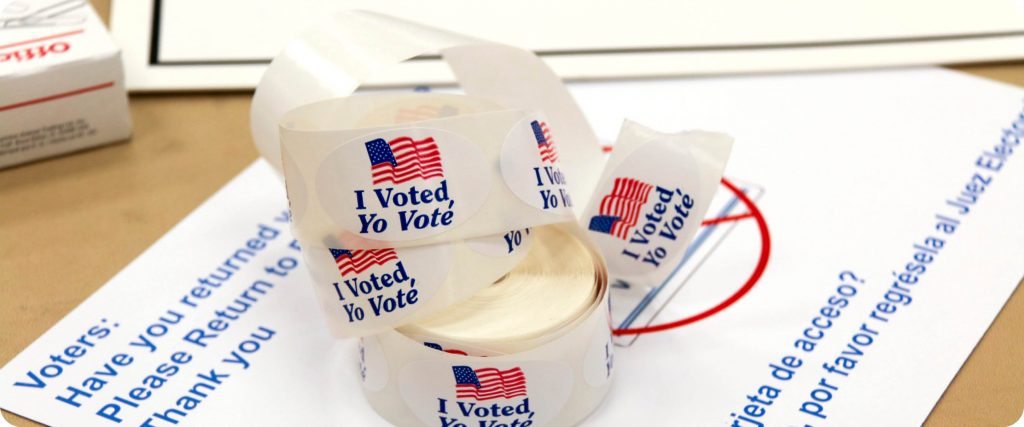by Joseph Meaney, PhD, KM, for the National Catholic Bioethics Center
October 8, 2024
Choosing the Lesser Evil in Voting
On his flight back from his recent pastoral visit to Asia, Pope Francis had an informal in-flight press conference. An American journalist, Anna Matranga, from CBS News, tried to draw a moral equivalence between supporting abortion and deporting immigrants with the following question: “With the US elections coming up, what advice would you give a Catholic voter who must decide between one candidate who is in favor of the interruption of pregnancy and another who wants to deport 11 million migrants?” The Holy Father answered, “Both are against life: the one who throws out migrants and the one who kills children,” and he went on to say that not to care for migrants is a fault, even a sin, but he insisted the Church forbids abortion because it is murder.
The journalist followed up with another question trying to pin Pope Francis down. “In your opinion, Your Holiness, are there circumstances in which it is morally permissible to vote for a candidate who is in favor of the interruption of pregnancies?” He refused to give a yes or no answer and responded that each person must make a decision in conscience. “In political morality, it is generally said that not voting is wrong, it is not good. One must vote. And one must choose the lesser evil.” This, of course, led to myriad headlines about the pope advocating that Catholics choose the “lesser evil” in this election as if it was a revolutionary concept.
Voting is an Important Conscientious Decision for Catholics
I touched on this topic in an essay before the 2020 election. “Voting is an important conscientious decision for Catholics and all persons of good will but is complicated by the fact that in this fallen world no perfect candidates exist.” It is sadly normal for Catholics to have to sift through the areas of disagreement with candidates on both prudential and ethical issues and pick the one who is better but certainly not the best possible person for the job. The Church and the US Bishops make it abundantly clear, however, that some issues have much greater moral importance than others when evaluating imperfect politicians and their policy positions.
After a debate in late 2023, the US Bishops re-affirmed in their teaching document, “Forming Consciences for Faithful Citizenship,” that abortion is the most significant moral issue for politics in America. “The threat of abortion remains our pre-eminent priority because it directly attacks our most vulnerable and voiceless brothers and sisters and destroys more than a million lives per year in our country alone.” They want faithful Catholics to understand that not all issues have the same moral weight when evaluating which candidates have stances that are closer to Catholic teaching. They present many important concerns but insist abortion ranks higher than all the other threats to the dignity of the human person, such as euthanasia, gun violence, terrorism, the death penalty, and human trafficking. The list put together by the US bishops also includes the redefinition of marriage and gender, threats to religious freedom at home and abroad, lack of justice for the poor, the suffering of migrants and refugees, wars and famines around the world, racism, the need for greater access to health care and education, and care for our common home.
Unexpected Pro-Life Issues
One unexpected pro-life ethical issue that has arisen this election cycle is being in favor of government funding for in vitro fertilization (IVF), or requiring medical insurance to cover these procedures. It is tragic that both Donald Trump and Kamala Harris give almost unqualified support to IVF. I remember a pro-life doctor in Croatia telling me that so many embryonic children are killed or die in the IVF process that he was sure IVF caused the deaths of more children in his country than surgical abortion did.
The American journalist doing the in-flight interview touched on a very significant point. Given the pre-eminent priority of stopping the threat of legal abortion, how could an American Catholic vote in good conscience for an extremely pro-abortion candidate? It is not clear what, if any, circumstances could justify that. Neither the US bishops nor the Pope want to endorse candidates as this is not their role as religious leaders. They do, however, point to the special gravity of promoting legal abortion and that no other issue rises to the same level of importance when discerning for whom to vote. There is a tremendous divide between Vice President Harris’s aggressive promotion of legal abortion and former president Trump’s refusal to support abortion. His appointment of pro-life Justices made the reversal of the Roe v. Wade abortion ruling by the US Supreme Court possible. At a seminar of the NCBC on October 26th Cardinal Gerhard Müller, the former Prefect of the Congregation for the Doctrine of the Faith, the highest doctrinal office in the Church, stated “There is no ‘pro-choice’ position. It is a pro-death position. There is no compromise between life and death. It is one or the other.”
Beyond Just Choosing the Lesser Evil
The ethical principle of choosing the lesser evil definitely applies to voting for candidates. It is unfortunate that, in many cases, we do not have better politicians to choose from. This points to the responsibility not just to vote but to be actively involved in the process of selecting leaders. Encouraging good people to run for office and supporting them in primary elections is highly preferable to passively lamenting the final choices we have.
Read the original article on how and why we are called to choose the lesser evil in voting by clicking here.

Joseph Meaney, PhD, KM
Joseph Meaney received his PhD in bioethics from the Catholic University of the Sacred Heart in Rome. His doctoral program was founded by the late Elio Cardinal Sgreccia and linked to the medical school and Gemelli teaching hospital. His dissertation topic was Conscience and Health Care: A Bioethical Analysis. Dr. Meaney earned his master’s in Latin American studies, focusing on healthcare in Guatemala, from the University of Texas at Austin. He graduated from the University of Dallas with a BA in history and a concentration in international studies. The Benedict XVI Catholic University in Trujillo, Peru, awarded Dr. Meaney an honorary visiting professorship. The University of Dallas bestowed on him an honorary doctorate in Humane Letters in 2022.

